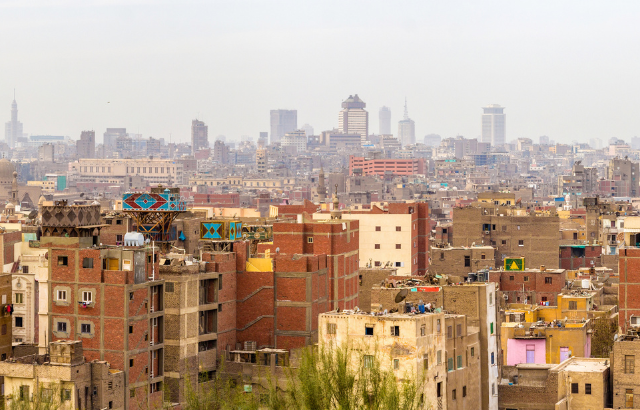Facing the future together – Improving EU-UK relations in a post-Brexit world
Spread over the course of two days, featuring over 30 global experts and accommodating over a dozen internationally renowned organisations, this timely event took place one year after Brexit. Reflecting on this first anniversary, this event saw great energy put into discussions from a consortium of fantastic speakers, powered by an abundance of insight and research on EU-UK relations and global challenges such as food security and climate change.

Pictured from space a number of lights travel to different locations from the UK
The 2022 NEXTEUK Conference on Global Order and The Future of EU-UK Relations was an opportunity for high-level decision-makers, experts, and scholars to discuss these issues and exchange ideas about the impact of Brexit, the future of EU-UK relations, and Global Order. The panels and policy roundtables – held partly in partnership with the Queen Mary Global Policy Institute - were organised around key topics such as:
- EU-UK security relationship
- EU-UK trade and economic relationship and policies
- EU and UK post-Brexit foreign and defence strategies
- EU-UK sectoral relations
- Transatlantic and multilateral cooperation
- Climate change and the challenges to human security
This conference was organised by NEXTEUK, a Jean Monnet Centre for Excellence co-funded by the Erasmus+ scheme led by Dr Sarah Wolff, Director of the Centre for European Research, Queen Mary University of London. The event took place with support from Queen Mary Global Policy Institute and the University of London Institute in Paris.
Identifying opportunities by crossing the seas of change
An astute introduction came from a trilogy of speakers.
“A compelling subject which should enable us to navigate the somewhat choppy waters generated by debates around fishing quotas. For the global order demands more bilateral more multilateral cooperation."
Professor Colin Grant, Vice Principal (International), Queen Mary University of London whose welcome address set the tone for proceedings.
Dr Valsamis Mitsilegas, Dean for Europe, Queen Mary University of London provided a narrative for proceeding discussions.
He identified two challenges to EU-UK cooperation in criminal justice:
1. Will the EU keep prioritising UK operational requests?
2. How far the UK will diverge from EU standards in data protection and human rights?
Dr Sarah Wolff, NEXTEUK, Queen Mary University of London highlighted that this event acted as a hub to bring together a range of stakeholders such as academics and policymakers.
Watch the opening speeches in full:
A conversation with ambassadors
How can we look to improve relations in future years? Welcome speeches from ambassadors past and present provided notable insight.
“In a world facing more disorder than order it becomes more important we cooperate closely”
Sylvie Bermann, President of the Board of Directors of the IHEDN, former French Ambassador to the UK
Menna Rawlings, British Ambassador to France spoke eloquently about Franco-British relations, in that they are about mutual trust and shared values.
“Love does not consist of gazing at each other, but in looking outward together in the same direction."
Read her thoughts post-event:
Watch the opening addresses in full:
Two days of incisive discussions
Following introductions and welcome, the remaining format for this event consisted of a variety of roundtables and discussions which you can watch below:
Queen Mary Global Policy Institute - NEXTEUK Policy Roundtable: The Future of the EU-UK Security Relationship: Re-establishing Trust
In this opening roundtable, an emphasis on rebuilding relations was key.
"Cooperation can take place through multiple fora" - Jean-Marc Vigilant, Director, Ecole de Guerre
Watch this roundtable in full:
Speakers:
Moderator: Sarah Wolff, Director of the Center for European Research, NEXTEUK Principal Investigator, Queen Mary University of London.
Alice Pannier, Head of the Geopolitics of Technology Program, Institut français des relations internationals
Jean-Marc Vigilant, Director, Ecole de Guerre
Dr Violeta Moreno-Lax, Full Professor of Law, Queen Mary University of London
Paul Taylor, Columnist for POLITICO, Senior Fellow at Friends of Europe
Dr Valsamis Mitsilegas, Dean for Europe, Queen Mary University of London
Selective reconstruction: Conceptualising (re-)engagement in post-Brexit UK-EU security relationship
Encompassing four different areas, Chair Dr Valsamis Mitsilegas, QMUL oversaw a discussion that brought to life a number of solutions and best practise for conceptualising reengagement.
This included:
- ‘Muddling through as the best of frenemies: UK preferences and practices in the post- Brexit EU-UK foreign, security and defence policy relationship’ Richard Whitman, Univ. of Kent
- ‘Historical (de-)institutionalism and the breakdown in UK-EU security cooperation’ Monika Sus, Hertie School; Benjamin Martill, Univ. of Edinburgh
- ‘UK-EU cybersecurity relations post-Brexit: From special cooperation to selectivity and differentiation’ Helena Carrapico, Northumbria University; George Christou, Warwick Univ.
- ‘EU-UK diplomatic and security coordination beyond Brexit through informal venues: Risk or opportunity?’ Sarah Wolff, QMUL; Agathe Piquet, QMUL; Helena Carrapico, Northumbria Univ.
The Discussant for this event was Nicholas Wright, Univ. of Surrey.
The impact of Brexit on EU-UK sectoral relations
The chair for this panel, Fernando Barrio, Academic Lead for Resilience and Sustainability, Queen Mary Global Policy Institute, introduced a wide range of topics into this discussion via an assorted panel. Speakers and topics included:
- ‘Future EU-UK relations on critical infrastructures: How to govern energy and finance?’ Sandra Eckert, Aarhus Institute of Advanced Studies
- ‘The future of professional sport in Europe: The consequences of the new UK-EU relationship’ Benjamin Jones, Univ. of Tours
- ‘Brexit weakening the Brussels effect’ Arina Lazareva, UPEC
The Discussant for this event was Ragnar Weilandt, KU Leuven.
Queen Mary Global Policy Institute - Queen Mary School of Business and Management - NEXTEUK Policy Round Table: Climate Change and the challenges to Human Security in the Global Order: Perspectives on policies and the impact on food security
In this wide-ranging discussion, Khetsiwe Khumalo emphasized that climate change is a threat multiplier and that food security, already exposed to climate change, has been further damaged by COVID-19.
Speakers included:
Moderator: Fernando Barrio, Academic Lead for Resilience and Sustainability, Queen Mary Global Policy Institute
Lea Perekrests, Deputy Director of Operations for Europe & MENA, Institute for Economics and Peace in Brussels
Ana Coelho, Programme Coordinator, Centre for Sustainability Research of FGV Brazil
Khetsiwe Khumalo, Climate Change Programme Coordinator at Ministry of Tourism and Environmental Affairs, Eswatini
Watch this panel in full:
Recap on the event in full:
